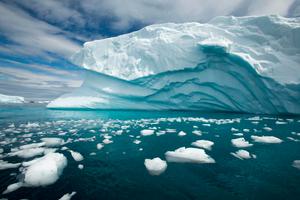Oceans
-
Can Virtual Reality Emerge As a Tool for Conservation?
New advances in technology are sparking efforts to use virtual reality to help people gain a deeper appreciation of environmental challenges. VR experiences, researchers say, can be especially useful in conveying key issues that are slow to develop, such as climate change and extinction.
-
Unable to Endure Rising Seas, Alaskan Villages Stuck in Limbo
As an advocate for Alaska’s Native communities, Robin Bronen points to a bureaucratic Catch-22 — villages cannot get government support to relocate in the face of climate-induced threats, but they are no longer receiving funds to repair their crumbling infrastructure.
-
A Tiny Pacific Nation Takes the Lead on Protecting Marine Life
Unhappy with how regional authorities have failed to protect fish stocks in the Western Pacific, Palau has launched its own bold initiatives creating a vast marine sanctuary and conducting an experiment designed to reduce bycatch in its once-thriving tuna fishery.
-
A Rather Bizarre Bivalve Stirs Controversy in the Puget Sound
The Asian market for the odd-looking giant clams known as geoducks has spawned a growing aquaculture industry in Washington's Puget Sound. But coastal homeowners and some conservationists are concerned about the impact of these farming operations on the sound’s ecosystem.
-
Point/Counterpoint: Should Green Critics Reassess Ethanol?
Former U.S. Senator Timothy Wirth and former White House Counsel C. Boyden Gray argue that environmental criticisms of corn ethanol are unwarranted and that the amount in gasoline should be increased. In rebuttal, economist C. Ford Runge counters that any revisionist view of ethanol ignores its negative impacts on the environment and the food supply.
-
As Drought Grips South Africa, A Conflict Over Water and Coal
Facing one of the worst droughts in memory, South Africa’s leaders have doubled down on their support of the water-intensive coal industry. But clean energy advocates say the smartest move would be to back the country’s burgeoning wind and solar power sectors.
-
Saving Amphibians: The Quest To Protect Threatened Species
The decline of the world’s amphibians continues, with causes ranging from fungal diseases to warmer and drier climates. Now, researchers are looking at ways to intervene with triage measures that could help save the most vulnerable populations.
-
Climate Consequences
Abrupt Sea Level Rise Looms As Increasingly Realistic Threat
-
From Mass Coral Bleaching, A Scientist Looks for Lessons
For climate scientist Kim Cobb, this year’s massive bleaching of coral reefs is providing sobering insights into the impacts of global warming. Yale Environment 360 talked with Cobb about the bleaching events and the push to make reefs more resilient to rising temperatures.
-
How Satellites and Big Data Can Help to Save the Oceans
With new marine protected areas and an emerging U.N. treaty, global ocean conservation efforts are on the verge of a major advance. But to enforce these ambitious initiatives, new satellite-based technologies and newly available online data must be harnessed.
-
How Ocean Noise Pollution Wreaks Havoc on Marine Life
Marine scientist Christopher Clark has spent his career listening in on what he calls “the song of life” in the world’s oceans. In an interview with Yale Environment 360, he explains how these marine habitats are under assault from extreme—but preventable—noise pollution.
-
New Green Challenge: How to Grow More Food on Less Land
If the world is to have another Green Revolution to feed its soaring population, it must be far more sustainable than the first one. That means finding ways to boost yields with less fertilizer and rethinking the way food is distributed.
-
Food Insecurity: Arctic Heat Is Threatening Indigenous Life
Subsistence hunters in the Arctic have long taken to the sea ice to hunt seals, whales, and polar bears. But now, as the ice disappears and soaring temperatures alter the life cycles and abundance of their prey, a growing number of indigenous communities are facing food shortages.
-
In Flint Crisis, A New Model For Environmental Journalism
Curt Guyette is an investigative reporter who dug deeper into the Flint water crisis. In an interview with Yale Environment 360, he explains his work as a journalist employed by a Michigan nonprofit and how it could be a model for in-depth, local reporting on the environment.
-
The Carbon Counters: Tracking Emissions in a Post-Paris World
In the wake of the Paris climate agreement, developing countries find themselves in need of analysts capable of monitoring their emissions. It’s a complex task, but organizations are stepping in with online courses to train these new green accountants.
-
Can Data-Driven Agriculture Help Feed a Hungry World?
Agribusinesses are increasingly using computer databases to enable farmers to grow crops more efficiently and with less environmental impact. Experts hope this data, detailing everything from water use to crop yields, can also help the developing world grow more food.
-
Rethinking Urban Landscapes To Adapt to Rising Sea Levels
Landscape architect Kristina Hill focuses on helping cities adapt to climate change, particularly sea level rise. In an interview with Yale Environment 360, she discusses the challenges, solutions, and costs of saving cities from encroaching oceans.
-
In Mexico, Fish Poachers Push Endangered Porpoises to Brink
China’s lucrative black market for fish parts is threatening the vaquita, the world’s most endangered marine mammal. The porpoises, who live only in the Gulf of California, are getting caught up as bycatch in illegal gill nets and killed.
-
El Niño and Climate Change: Wild Weather May Get Wilder
This year’s El Niño phenomenon is spawning extreme weather around the planet. Now scientists are working to understand if global warming will lead to more powerful El Niños that will make droughts, floods, snowstorms, and hurricanes more intense.
-
Can Large Companies Lead The Low-Carbon Revolution?
The dismissal of a green advocate at a major energy corporation and other recent developments raise a critical question: Are big companies too invested in the status quo to be trailblazers in the quest to wean the global economy off fossil fuels?

